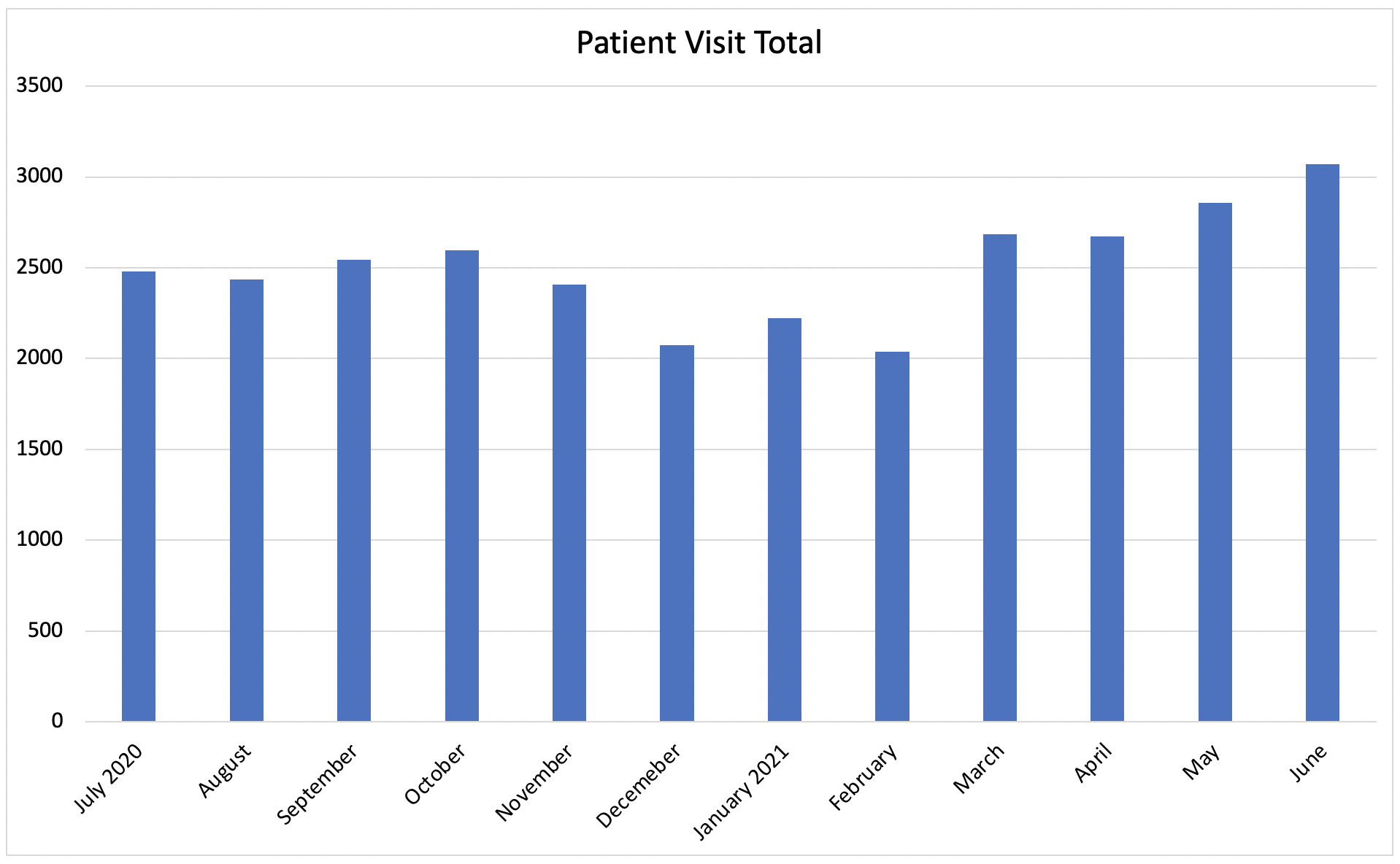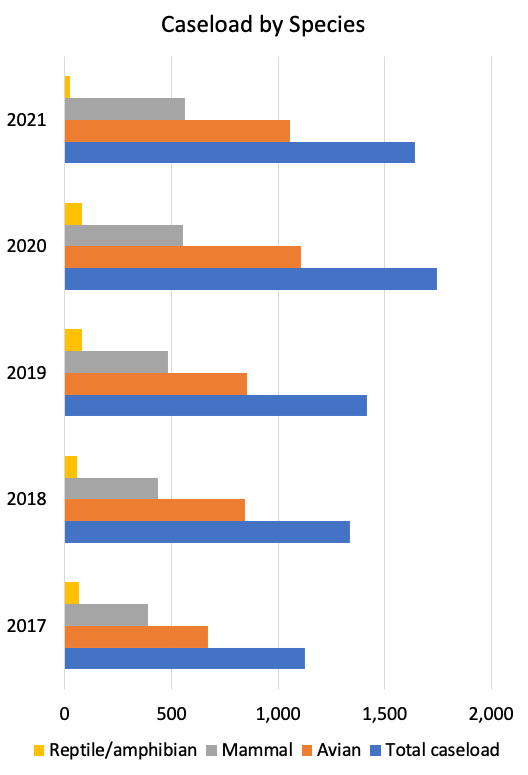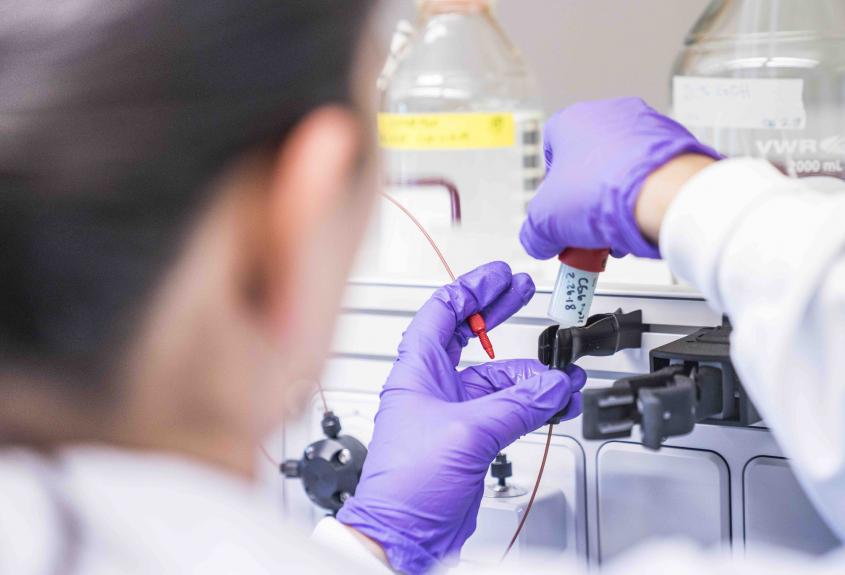Advances in Animal, Human and Ecosystem Health
We have used our experiences during the COVID-19 pandemic to redefine client service and enhance our use of telemedicine tools. From the creation of a new operations team, to hiring clinicians and technicians in key areas, to renovating areas of the hospital and becoming a model for ezyVet use in academia, we are committed to the health of individual animals, herds and our own community, as well as to building international programs and partnerships.
Read our 2018-2022 Strategic Plan for more.
CUHA Cases at a Glance
*Wildlife cases are also included in the CUHA total above
Cornell University Hospital for Animals
Caseload by species
| Species | Caseload |
|---|---|
| Canine | 20,056 |
| Feline | 4,761 |
| Equine | 1,429 |
| Avian & wildlife | 1,319 |
| Bovine | 143 |
| All other large animal | 1,659 |
| All other small animal | 3,072 |
| Total (all small and large animal) | 30,083 |
Caseload by month

Janet L. Swanson Wildlife Hospital

Cornell University Veterinary Specialists
Stamford, Connecticut
- 22% caseload increase vs. fiscal year 2020
- 125 staff
- 16 specialists
- 6 Residents
Newly-Launched Department of Public and Ecosystem Health
The Department of Public and Ecosystem Health represents a bold new approach in academia. Rather than organize around a common discipline or approach, Public and Ecosystem Health brings public health professionals, biophysical and social scientists, and veterinarians together to address three of the world’s greatest challenges: achieving healthy food systems, tackling emerging health threats, and conserving biodiversity. We seek not only to understand these wicked problems through research, but also to address them directly through public health and clinical veterinary practice. Quite simply, our students, staff, and faculty seek to change the world.
Cornell Wildlife Health Center
The Cornell Wildlife Health Center (CWHC) continues to enhance synergy among many of Cornell’s wildlife-focused programs, expand student learning opportunities, and capitalize on earnest interdisciplinary approaches to addressing key wildlife conservation and related public health challenges. Throughout the COVID-19 pandemic, our One Health experts have emphasized the fact that our own health and well-being are intimately tied to how we treat the natural world - that we need to secure a healthy future for wildlife and wild places in order to secure a healthy future for humanity.
By the Numbers
Outreach Efforts
- Providing thought leadership on the COVID-19 pandemic’s likely origins, and the importance of using a One Health lens to decrease the chances of future pandemics
- Co-hosting a virtual symposium with World Wildlife Fund and Cornell Atkinson (CA), "Emerging Disease, Wildlife Trade and Consumption: The Need for Robust Global Governance."
- Assisting Congressional offices with drafting a bipartisan bill, the Preventing Future Pandemics Act
- Publishing key science-based recommendations for protecting endangered species, including tigers, African rhinos, African elephants, and black-footed ferrets
- Mentoring veterinary and graduate students pursuing careers in wildlife conservation and One Health
National Projects
- Diagnosing causes of freshwater fish disease outbreaks
- Promoting non-lead ammunition to reduce the toxicity threat to people and ecosystems, including in bald eagles
- Mitigating risks of chronic wasting disease on deer, elk and moose
- Protecting Hawai‘i’s wild birds from avian malaria
- Evaluating how climate change may be increasing disease threats to Arctic specialists like gyrfalcons
International Projects
- Studying the threat of canine distemper virus to endangered tigers in key habitats
- Addressing land-use challenges at the livestock / wildlife interface in southern Africa
- Improving community livelihoods and livestock practices to underpin snow leopard conservation in Central Asia
- Exploring community-based interventions to reduce human-leopard conflict in Nepal
- Mitigating infectious disease threats to Indonesia’s critically endangered Javan rhino
- Investigating mysterious rhino deaths in Nepal
Learn more about our ongoing projects by visiting our website.
Animal Health Diagnostic Center (AHDC) & New York State Veterinary Diagnostic Laboratory

Diagnostic services and expert advice for veterinary professionals and animal and public health stakeholders
COVID Leadership
- AHDC scientists closely collaborated with Cayuga Medicine Medical Center to validate a high-throughput real-time PCR assay for SARS-CoV-2.
- Established the Cornell COVID Testing Lab (CCTL), the cornerstone of the Cornell COVID-19 response and prevention program. It relies on high-tech robotics and computing to pool samples, automate many of the processes, and report results one day after sampling.
- The CCTL began formally processing tests on August 17, 2020 and since then have tested over 1.5M individual samples.
Accessions*, Percentage by Species Group
| Accession Type | Percentage |
|---|---|
| Equine | 48% |
| Companion Animals | 32% |
| Food & Fiber | 15% |
| Other Species | 5% |
*Accession refer to an ordered test or group of tests from a client, and can include one or multiple samples.
- 16% increase FY 2018 to FY 2021
- March through May 2020 COVID-19-related depression in accession numbers, reversed by June 2020
| State | Number of Accessions |
|---|---|
| New York* | 106,894 |
| Pennsylvania |
15,773 |
| Massachusetts |
13,007 |
| California |
11,920 |
| Florida |
9,362 |
| Virginia |
7,203 |
| Maryland |
6,254 |
| New Jersey |
6,007 |
| Vermont |
5,797 |
| Connecticut |
5,622 |
| Missouri |
4,951 |
| All Other States |
63,544 |
| Canada | 3,347 |
| Other Foreign | 1,539 |
| Total Accessions Processed | 261,220* |
*993 NYS veterinary client accounts, about 7,000 global veterinary client accounts
| Species | Number of Accessions |
|---|---|
| Equine |
134,921 |
| Canine |
68,858 |
| Bovine |
29,903 |
| Feline |
13,074 |
| Avian |
3,232 |
| Caprine |
3,211 |
| Ovine |
1,125 |
| Porcine |
1,050 |
| Rodentia |
940 |
|
Cervidae |
856 |
| Environmental |
772 |
| Camelids | 730 |
| Primate |
664 |
| All other species |
2,824 |
| Total Accessions Processed | 261,220 |


